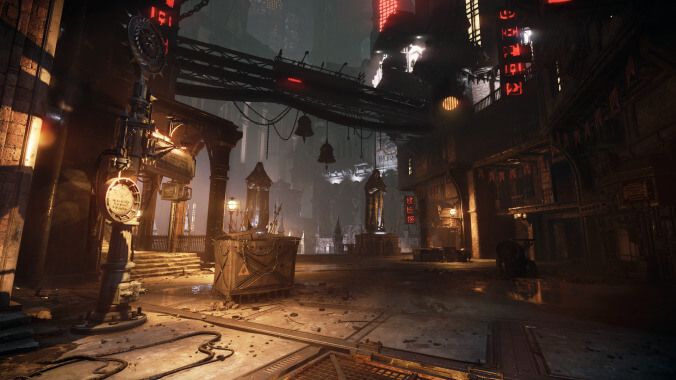Game Theory: We're getting down in the blood and guts of Warhammer 40,000
Between new releases of Darktide, and the upcoming Rogue Trader, video games are tackling one of tabletop's most venerable and violent franchises

Every Friday, A.V. Club staffers kick off the weekend by taking a look at the world of gaming, diving in to the ideas that underpin the hobby we love with a bit of Game Theory. We’ll sound off in the space above, and invite you to respond down in the comments, telling us what you’re playing this weekend, and what theories it’s got you kicking around.
Warhammer 40K is one of those gaming brands with intimidation built right into its name—because, after all, how the hell is a new player supposed to follow its vision of a grimdark future if they haven’t already played Warhammers 1 through 39,999?
But even beyond that (extremely dumb) joke, Games Workshop’s venerable war gaming brand has a healthy scare factor built into its DNA, courtesy of years of hardcore tabletop gaming mixed with a whole universe of novels, stories, and video games. Warhammer is having a pretty good 2023 in terms of getting its message—roughly summed up as “Oh shit, literally everything in the galaxy is trying to kill us”—in front of more people, though; Darktide, Fatshark’s 40K update to its long-running Vermintide series of first-person shove-and-shooters, has just landed on Xbox and GamePass, while Pathfinder developer Owlcat Games is preparing to release Rogue Trader, a new turn-based role-playing game set in a different (if still extremely violent and nasty) corner of the far-flung universe. Truly, it’s never been easier to spend time with the insane, pustule-ridden people of the future!
In playing the two games over the last few weeks, it’s been fascinating to have two very different perspectives—both literally, and otherwise—on this particular set of ugly, awful worlds. The characters you play as in each game couldn’t be further apart, in terms of status: Darktide positions you as a conscripted prisoner, tossed into suicide missions by a whole crew of taskmasters who could each have you executed with a single word. Rogue Trader, meanwhile, has you take on its titular role, which, in the highly class-based society of 40K’s Imperium Of Mankind, is sort of like a mixture of a frontier explorer, an old-school privateer, and a roving duke or duchess. (The ship you travel through space in, for instance, is crewed by hundreds of thousands of serfs, many of whom have been toiling for your glory for generations.) It’s rare to get this kind of look at both the bottom and the top of a single fictional society at one time, and it highlights the interesting oddities of Warhammer’s often brutal approach to storytelling.

 Keep scrolling for more great stories from A.V. Club.
Keep scrolling for more great stories from A.V. Club.